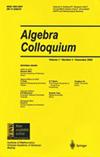由斐波那契公式导出的丢番图对的完全解
IF 0.4
4区 数学
Q4 MATHEMATICS
引用次数: 0
摘要
如果[公式:见文本]是所有[公式:见文本]的完全平方,则一个正整数集[公式:见文本]称为丢番图[公式:见文本]-元组。设[公式:见文]为[公式:见文]的丢番图三元。本文给出了三元约简的条件[公式:见文],并利用这一结果证明了丢番图对[公式:见文]的可拓性,其中[公式:见文]是[公式:见文]-斐波那契数。本文章由计算机程序翻译,如有差异,请以英文原文为准。
Complete Solution of Diophantine Pairs Induced by Some Fibonacci Formula
A set [Formula: see text] of positive integers is called a Diophantine [Formula: see text]-tuple if [Formula: see text] is a perfect square for all [Formula: see text]. Let [Formula: see text] be the Diophantine triple with [Formula: see text]. In this paper, we find the condition for the reduction of third element [Formula: see text], and using this result, we prove the extendibility of Diophantine pair [Formula: see text], where [Formula: see text] is the [Formula: see text]-th Fibonacci number.
求助全文
通过发布文献求助,成功后即可免费获取论文全文。
去求助
来源期刊

Algebra Colloquium
数学-数学
CiteScore
0.60
自引率
0.00%
发文量
625
审稿时长
15.6 months
期刊介绍:
Algebra Colloquium is an international mathematical journal founded at the beginning of 1994. It is edited by the Academy of Mathematics & Systems Science, Chinese Academy of Sciences, jointly with Suzhou University, and published quarterly in English in every March, June, September and December. Algebra Colloquium carries original research articles of high level in the field of pure and applied algebra. Papers from related areas which have applications to algebra are also considered for publication. This journal aims to reflect the latest developments in algebra and promote international academic exchanges.
 求助内容:
求助内容: 应助结果提醒方式:
应助结果提醒方式:


